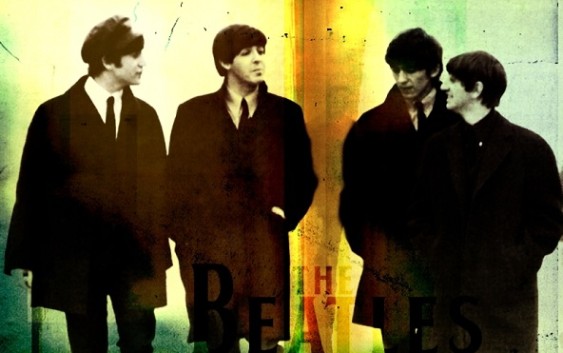Hawai`i and The British Invasion

In 1964, four little known about lads that called themselves The Beatles released their first recordings in the U.S., and on February 9, 1964 at 8pm, the Fab Four made their U.S. television debut on The Ed Sullivan Show. And music – and the world – would would never be the same.
That story has been chronicled countless times. But what has not been discussed has been the effect of the British Invasion on the evolution of music in Hawai’i.
As has been discussed in this blog previously, Hawaiian music took some very interesting – albeit expected – turns in the 1960s. With statehood and the jet plane came the need for Hawai’i’s musicians to remain relevant for the burgeoning tourist crowd – not necessarily for record sales, but certainly to remain viable as Waikiki club acts. Traditional Hawaiian music and hula began to share nightclub and record store shelf space with rock-and-roll, bossa nova, and even go-go. Once The Beatles were “the thing,” this, too, became a force for the local musicians to reckon with.
In our discussion of both Kui Lee and Frank Sinatra’s influence on entertainers in Hawai`i the distinction was clear that performing and songwriting were once separate-but-equal artistic endeavors. Few artists were equally adept at both. But John Lennon and Paul McCartney were among the pioneers of creating an entire entertainment experience – crafting not only the lyric and the accompanying melodic and harmonic structures, but also creating the enduring arrangements that made their songs iconic and performing them – both in the studio and live – on their own instruments which they handled with increasing proficiencies as their lives and careers progressed. And in the process they created a unique sound which combined elements of roots music, early R&B, rockabilly, doo-wop, and – later – classical and prog rock, but ultimately which can only be described as “Beatlesque.”
One arranger in Hawai`i in particular took notice. Benny Saks (the former Benjamin Sakamoto) was a pianist, vibraphonist, and arranger with such notable Hawaiian music legends as Pua Almeida. But in the 1960s, he masterminded a new sound in Hawaiian music by combining these same elements with which The Beatles were experimenting – either inspired by or in spite of their success. If most of the Hawaiian music recording output in the 60s was rooted in tradition – Genoa Keawe, The Sons of Hawaii, the Kahauanu Lake Trio, and the entire Hula Records roster come to mind – Saks went on to arrange some of the most notable modern Hawaiian music on record for such artists as Marlene Sai, Billy Gonsalves and the Paradise Serenaders, Iwalani Kahalewai, Kai Davis, Myrtle K. Hilo, Leinaala Haili, Frank and Kathy Kawelo, and – leading the pack with the most collaborations with Saks – Bill Kaiwa.
But what about the songs? Over and over again since their appearance on the scene the Lennon/McCartney songbook has been visited by Hawai`i’s finest entertainers – from names as familiar as Buddy Fo, The Surfers, Melveen Leed, Keali`i Reichel, Teresa Bright, Shawn Ishimoto, and Na Leo Pilimehana and as obscure as The Family Tree and Al Lopaka. And although I have repeatedly invoked the names of “the cute Beatle” (McCartney) and “the smart Beatle” (Lennon), who can forget that it was “the quiet Beatle” (George Harrison) who was responsible for the career of a then young `ukulele phenom Jake Shimabukuro when a candid video of his version of “While My Guitar Gently Weeps” (recorded on a park bench in New York City’s Central Park) went viral on YouTube – making both Jake and YouTube household words? (It is worth noting the irony that Harrison was an avid collector of `ukulele and purchased many of these at Mandolin Brothers of Staten Island, NY – one of the five boroughs of New York City.)
Ho`olohe Hou Radio will honor the February anniversary of The Beatles arrival in the U.S. all month long by spinning their compositions performed by the local Hawai`i artists named above as well as the groundbreaking Beatles-influenced sides arranged by Benny Saks.

